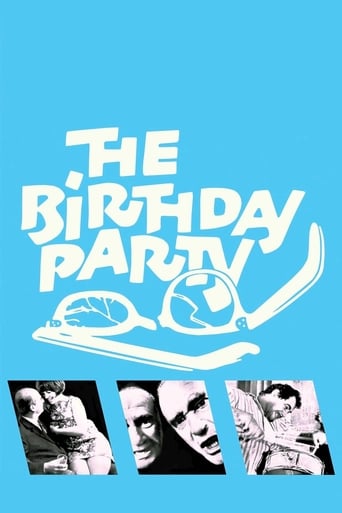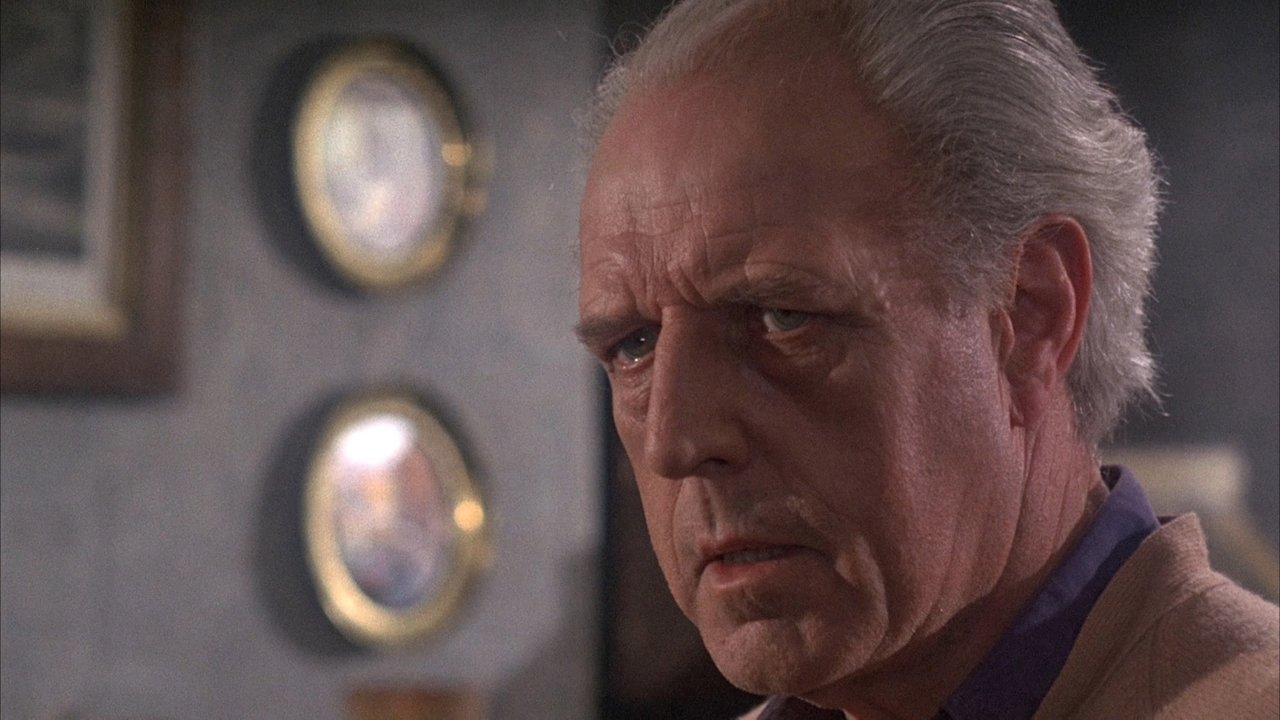solszew-1
Harold Pinter's brilliant early play-on-film, The Birthday Party, is one of his best efforts, and perhaps, with The Homecoming, the pinnacle of the Theater of the Absurd. The plot itself is simple. Two men come to visit Stanley, a classical pianist who has, for unknown reasons, left his home and is staying with a provincial couple. He is visited by Shamus McCann (Patrick McGee) and Nat Goldberg (Sydney Tafler). They alternately celebrate and menace Stanley, who may or may or may not know them. Nothing is clearly stated. Most of the dialogue consists of insinuations and vague threats. Performances across the board are outstanding, with Robert Shaw outdoing himself as Stanley Weber. Moultrie Keisall as Petey is excellent but understated, and his final words really put the cherry on the birthday cake. (sorry for the pun). Nothing I can say can communicate the unique strangeness and power of this film. Top marks, 5 stars, classic.
CitizenCaine
Harold Pinter adapted his own play for The Birthday Party, a bizarre and enigmatic film set in a seaside boardinghouse. Robert Shaw stars as Stanley Weber, an unemployed, failed pianist holes up in a dingy rented room only to have two strangers arrive who insidiously badger, pester, and eventually terrorize him to the point of speechlessness. With the play being written near the height of the Cold War movement in 1958, some critics have suggested Pinter is making a statement about living under a brutal Communist regime where every state action and thought is predicated on controlling and undermining the actions and thoughts of others. Meanwhile, the simple and deluded types, such as the owners of the boardinghouse, are lulled into a quasi-free existence in which they are obedient, easily influenced, or believe what they are told.The claustrophobic setting highlights the irrelevance of surroundings when one's thoughts are easily controlled or influenced. The symbolism of the game of blind man's bluff and the eyeglasses incident are not lost on the viewer considering this perception of Pinter's play. As in most of Pinter's plays, the dialog is a standout as well as the acting of the four leads. The play could just as easily be seen as an experience that confounds the viewer with its conundrums and its lack of empathy for the characters. It's reminiscent of Beckett's "Waiting For Godot" and Kafka's "The Trial", both of which are open to multiple interpretations requiring multiple viewings in order to gain additional perspectives. William Friedkin directed this, his second feature, because Pinter probably couldn't get anyone else to do it. It's definitely not a film for all tastes. *** of 4 stars.
shepardjessica-1
A wonderful play (which I've directed in the 80's) that cuts a scene from the play with Lulu..but is still PINTER! What can you say about this '58 play (film '68) except to say it's INTENSE. Robert Shaw as Stanley (post-James Bond and pre-Jaws and pre-The Sting)..most Americans (no offence)..don't even know who this guy is. Anyway, it's a brilliant parody of English (and everybody in the 50's) take on the one artist. Sidney Taffler as Goldberg is comical, frightening, bossy, and just plain "too much there". Patrick MaGee as McCann (A CLOCKWORK ORANGE, BARRY LYNDON, Kubrick.etc.) is lone newspaper-ripping non-horror (or so you think) DUDE, who hung out with the The Beatles.Decent version of a great early play of a genius..which bombed..duh? Stick with Meg and Petey and you can't go wrong or right. 20 years ahead of it's time as a play and 10 years...right.
Tom May
I must say I will take a little umbrage at the meagre critical reception this film has got; it seems to have largely been just written off as "well acted, *but* not suited/adapted to film". I would have to say it's a good thing to try and broaden the audience for what is undeniably a fine play in my opinion, by making a film. The film sticks very closely to the dramatic text, and it's a critical truism to say that the immediacy of theatre performance is lost. It may well be that Pinter is particularly good on stage (certainly judging by a recent run of "The Collection" that I saw in September), but he's also been very effective cinematically, in the adaptations of "The Servant" and "Accident". This is certainly a more constrained film than "Accident", and a little more so than the claustrophobic "The Servant"; one could say the director and others involved with the film are playing it safe, but that's no problem really, as the formula was excellent to begin with. Certain exterior shots do add a lot I feel, as does the subtle, suggestive opening in the car. For a film as "theatrical" as this is claimed to be, it has good camera sense, and handles the dialogue neatly. The scene where it shifts to monochrome in the dark light I did like. I feel that the scotched, grim, mundane colour stock of the film is certainly in tune with the play and the though.Most important perhaps, in a performance of Pinter on film, are the performances, and I must declare them to be excellent and overlooked. Robert Shaw, an actor I always enjoy ("A Man for all Seasons" and "From Russia With Love" making up a decidedly contrasting threesome of Shaw films I've seen...), is proficient as Webber, the absurd "mystery man" laying low in a seaside boarding house. Most impressive to my mind though, are Dandy Nichols, Patrick Magee and Sydney Tafler. Nichols certainly plays the darkly hilarious role of the unknowing, deluded Meg to a veritable tee. Magee and Tafler define the roles of Goldberg and McCann, the sinister, well-versed double-act, to such an extent that I'll definitely think of them in the roles from now on, when I think of the play. Magee is a foreboding, but often unwittingly droll presence in the film, timing his acting brilliantly. His Irish tones contrast finely with Goldberg's sophisticated Jewish-London accent. Tafler is an absolute marvel in this role, walking away with the film in many ways, embellishing another elusive, odd Pinter character, the most erudite in the play. He fills the screen amply and times the dialogue perfectly; a stunning performance, by a somehow obscure actor. The chap who played Petey Boles is also good, in a small but certainly necessary part.Of course, one unfamiliar with Pinter may be bemused by the oddball plot, struggle to come up with instant meanings and then describe it as weird and incoherent, as if those were bad things... Of course, it isn't truly incoherent; there are meanings and interpretations to be made if one pays close attention to the dialogue. And it is the dialogue, that, as ever with Pinter, dazzles. Suffice to say, I am not truly in a position to analyze and describe why his dialogue is so brilliant in a mere film review such as this is, but trust me, his dialogue is remarkable; making the banal seem rich and sinister, and the rich seem banal and ritualistic (in Goldberg's case). A worthy effort really, this film, I'd say, as it captures so much of the Pinter brilliance.Rating:- ****/*****


 AD
AD



